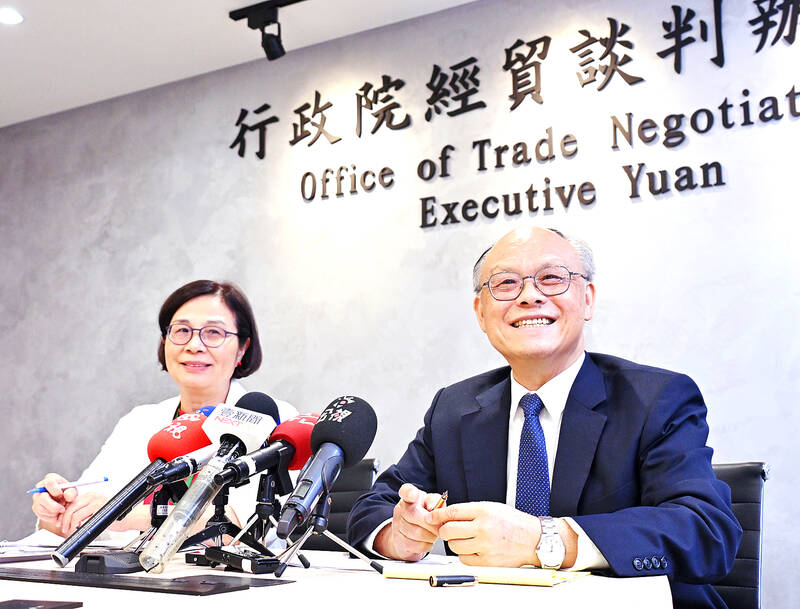Taiwanese officials have said that they believed talks on a Taiwan-US trade and double taxation deal would not be impacted by the election of a new US president.
The Executive Yuan’s Office of Trade Negotiations told CNA that Taiwan and the US have been in close communication over the first agreement in the "US-Taiwan Initiative on 21st-Century Trade" that was signed by both sides in June last year.
The office said the Taiwanese government is optimistic that the first agreement will take effect before the end of this year, as long as it gets the approval of the US Congress.

Photo: Fang Pin-chao, Taipei Times
This initial agreement covered areas of customs administration and trade facilitation, good regulatory practices, anticorruption and small- and medium-sized enterprises (SMEs).
In the meantime, the office said the second-phase negotiations of the initiative would focus on agriculture, labor and the environment.
So far, both governments have completed two rounds of in-person meetings and reached a consensus on a number of issues, it noted.
The office added that it is still uncertain if both sides will hold a third round of meetings soon.
It said that US Vice President Kamala Harris and former US president Donald Trump did not mention the Taiwan-US trade talks during their presidential campaigns, and that enhancing Taiwan-US trade relations has always enjoyed bipartisan support in the US Congress.
The office said it is confident the ongoing bilateral talks on the initiative would continue to proceed.
According to both governments’ press releases, Washington and Taipei launched the "US-Taiwan Initiative on 21st-Century Trade" in August 2022 to deepen their trade and investment relationship, advance mutual trade priorities, and promote innovation and inclusive economic growth for workers and businesses.
Aside from the trade initiative, the US and Taiwan announced last month that they would begin negotiations on a comprehensive agreement to address double taxation issues "in coming weeks."
"It [a comprehensive tax agreement] will reduce double taxation barriers for further investment by Taiwan into the United States, and vice versa, particularly for the SMEs that are crucial to a complete semiconductor ecosystem," a US Department of the Treasury press release issued on Tuesday last week said.
Asked by CNA if the pending talks on a double taxation deal were still on track to be held as scheduled, an unnamed official at the Ministry of Finance said both the current US administration and Congress across the political divide have supported the proposed deal.
The official said that the US Department of the Treasury is keen to hold the first round of the talks and that the Taiwanese government will make every effort to eliminate tax barriers to bilateral investment and trade.

When an apartment comes up for rent in Germany’s big cities, hundreds of prospective tenants often queue down the street to view it, but the acute shortage of affordable housing is getting scant attention ahead of today’s snap general election. “Housing is one of the main problems for people, but nobody talks about it, nobody takes it seriously,” said Andreas Ibel, president of Build Europe, an association representing housing developers. Migration and the sluggish economy top the list of voters’ concerns, but analysts say housing policy fails to break through as returns on investment take time to register, making the

NOT TO WORRY: Some people are concerned funds might continue moving out of the country, but the central bank said financial account outflows are not unusual in Taiwan Taiwan’s outbound investments hit a new high last year due to investments made by contract chipmaker Taiwan Semiconductor Manufacturing Co (TSMC, 台積電) and other major manufacturers to boost global expansion, the central bank said on Thursday. The net increase in outbound investments last year reached a record US$21.05 billion, while the net increase in outbound investments by Taiwanese residents reached a record US$31.98 billion, central bank data showed. Chen Fei-wen (陳斐紋), deputy director of the central bank’s Department of Economic Research, said the increase was largely due to TSMC’s efforts to expand production in the US and Japan. Investments by Vanguard International

EARLY TALKS: Measures under consideration include convincing allies to match US curbs, further restricting exports of AI chips or GPUs, and blocking Chinese investments US President Donald Trump’s administration is sketching out tougher versions of US semiconductor curbs and pressuring key allies to escalate their restrictions on China’s chip industry, an early indication the new US president plans to expand efforts that began under former US president Joe Biden to limit Beijing’s technological prowess. Trump officials recently met with their Japanese and Dutch counterparts about restricting Tokyo Electron Ltd and ASML Holding NV engineers from maintaining semiconductor gear in China, people familiar with the matter said. The aim, which was also a priority for Biden, is to see key allies match China curbs the US

STRUGGLING TO SURVIVE: The group is proposing a consortium of investors, with Tesla as the largest backer, and possibly a minority investment by Hon Hai Precision Nissan Motor Co shares jumped after the Financial Times reported that a high-level Japanese group has drawn up plans to seek investment from Elon Musk’s Tesla Inc to aid the struggling automaker. The group believes the electric vehicle (EV) maker is interested in acquiring Nissan’s plants in the US, the newspaper reported, citing people it did not identify. The proposal envisions a consortium of investors, with Tesla as the largest backer, but also includes the possibility of a minority investment by Hon Hai Precision Industry Co (鴻海精密) to prevent a full takeover by the Apple supplier, the report said. The group is